Core Knowledge for Mental Health Practice
VerifiedAdded on 2023/06/07
|14
|4098
|92
AI Summary
This paper discusses the principles, characteristics, and techniques of narrative therapy and cognitive behavioural therapy for substance abuse in mental health practice. Narrative therapy focuses on separating individuals from their problems and empowering them to make positive changes, while CBT is a short-term, goal-oriented treatment that changes patterns of thinking and behaviour. Both therapies require a strong therapeutic relationship between the client and therapist.
Contribute Materials
Your contribution can guide someone’s learning journey. Share your
documents today.
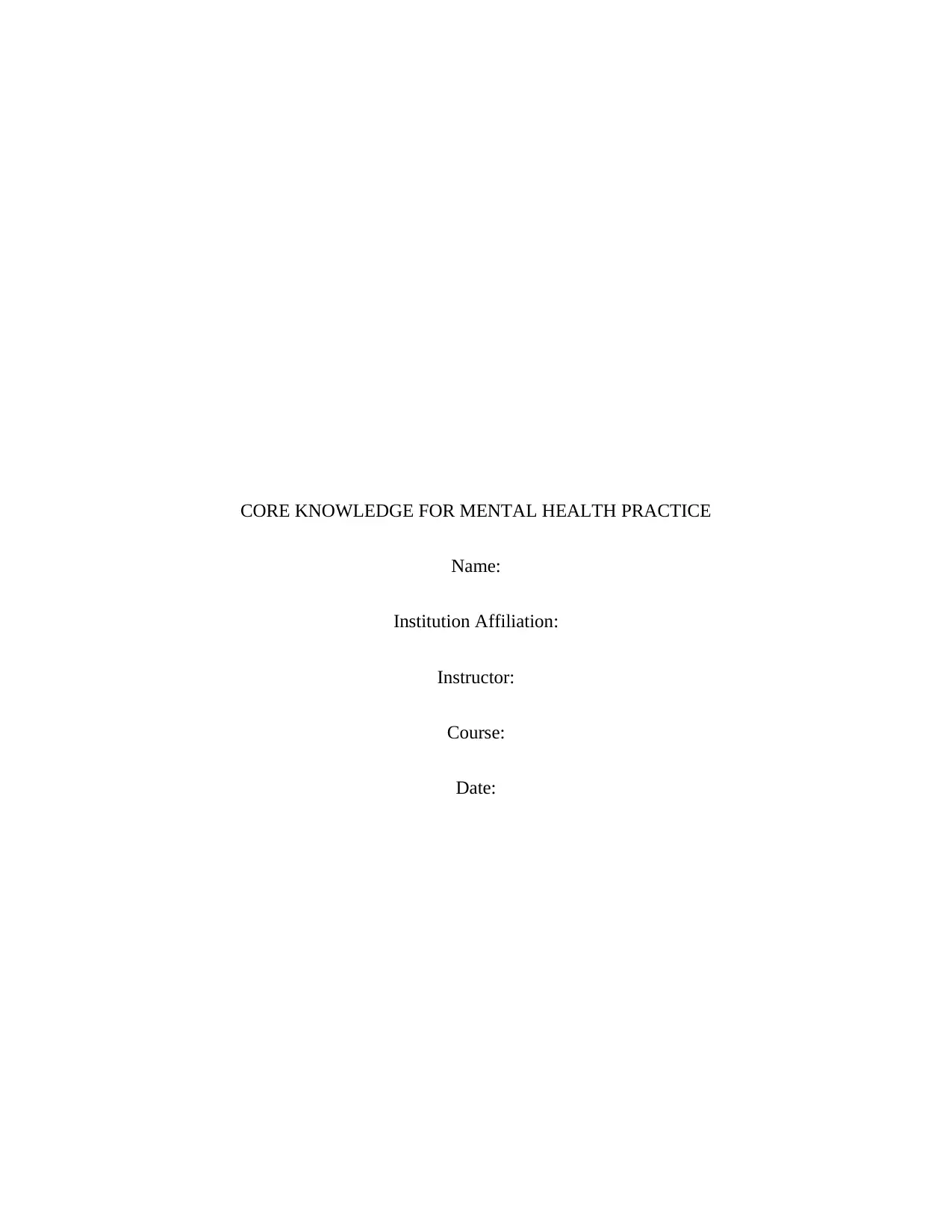
CORE KNOWLEDGE FOR MENTAL HEALTH PRACTICE
Name:
Institution Affiliation:
Instructor:
Course:
Date:
Name:
Institution Affiliation:
Instructor:
Course:
Date:
Secure Best Marks with AI Grader
Need help grading? Try our AI Grader for instant feedback on your assignments.
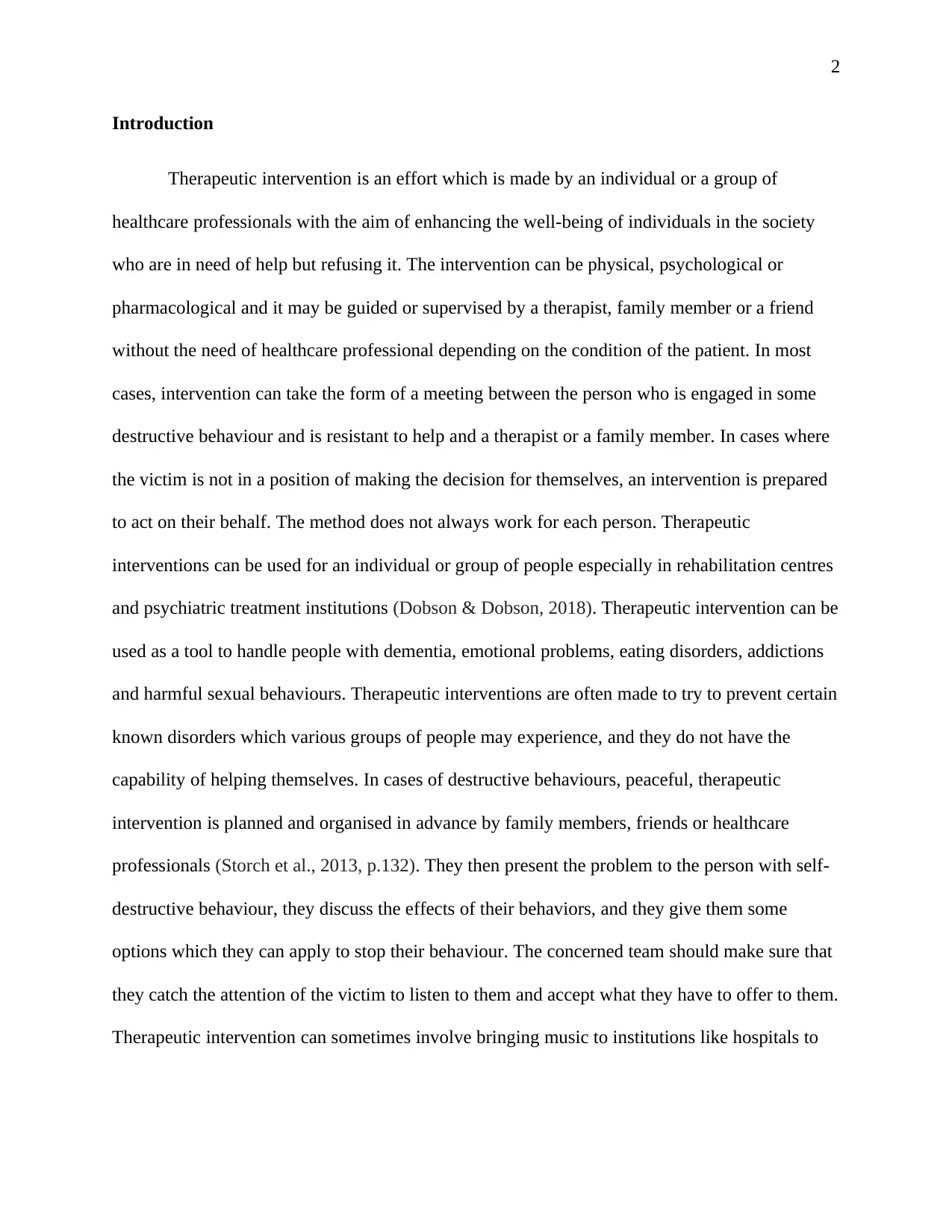
2
Introduction
Therapeutic intervention is an effort which is made by an individual or a group of
healthcare professionals with the aim of enhancing the well-being of individuals in the society
who are in need of help but refusing it. The intervention can be physical, psychological or
pharmacological and it may be guided or supervised by a therapist, family member or a friend
without the need of healthcare professional depending on the condition of the patient. In most
cases, intervention can take the form of a meeting between the person who is engaged in some
destructive behaviour and is resistant to help and a therapist or a family member. In cases where
the victim is not in a position of making the decision for themselves, an intervention is prepared
to act on their behalf. The method does not always work for each person. Therapeutic
interventions can be used for an individual or group of people especially in rehabilitation centres
and psychiatric treatment institutions (Dobson & Dobson, 2018). Therapeutic intervention can be
used as a tool to handle people with dementia, emotional problems, eating disorders, addictions
and harmful sexual behaviours. Therapeutic interventions are often made to try to prevent certain
known disorders which various groups of people may experience, and they do not have the
capability of helping themselves. In cases of destructive behaviours, peaceful, therapeutic
intervention is planned and organised in advance by family members, friends or healthcare
professionals (Storch et al., 2013, p.132). They then present the problem to the person with self-
destructive behaviour, they discuss the effects of their behaviors, and they give them some
options which they can apply to stop their behaviour. The concerned team should make sure that
they catch the attention of the victim to listen to them and accept what they have to offer to them.
Therapeutic intervention can sometimes involve bringing music to institutions like hospitals to
Introduction
Therapeutic intervention is an effort which is made by an individual or a group of
healthcare professionals with the aim of enhancing the well-being of individuals in the society
who are in need of help but refusing it. The intervention can be physical, psychological or
pharmacological and it may be guided or supervised by a therapist, family member or a friend
without the need of healthcare professional depending on the condition of the patient. In most
cases, intervention can take the form of a meeting between the person who is engaged in some
destructive behaviour and is resistant to help and a therapist or a family member. In cases where
the victim is not in a position of making the decision for themselves, an intervention is prepared
to act on their behalf. The method does not always work for each person. Therapeutic
interventions can be used for an individual or group of people especially in rehabilitation centres
and psychiatric treatment institutions (Dobson & Dobson, 2018). Therapeutic intervention can be
used as a tool to handle people with dementia, emotional problems, eating disorders, addictions
and harmful sexual behaviours. Therapeutic interventions are often made to try to prevent certain
known disorders which various groups of people may experience, and they do not have the
capability of helping themselves. In cases of destructive behaviours, peaceful, therapeutic
intervention is planned and organised in advance by family members, friends or healthcare
professionals (Storch et al., 2013, p.132). They then present the problem to the person with self-
destructive behaviour, they discuss the effects of their behaviors, and they give them some
options which they can apply to stop their behaviour. The concerned team should make sure that
they catch the attention of the victim to listen to them and accept what they have to offer to them.
Therapeutic intervention can sometimes involve bringing music to institutions like hospitals to
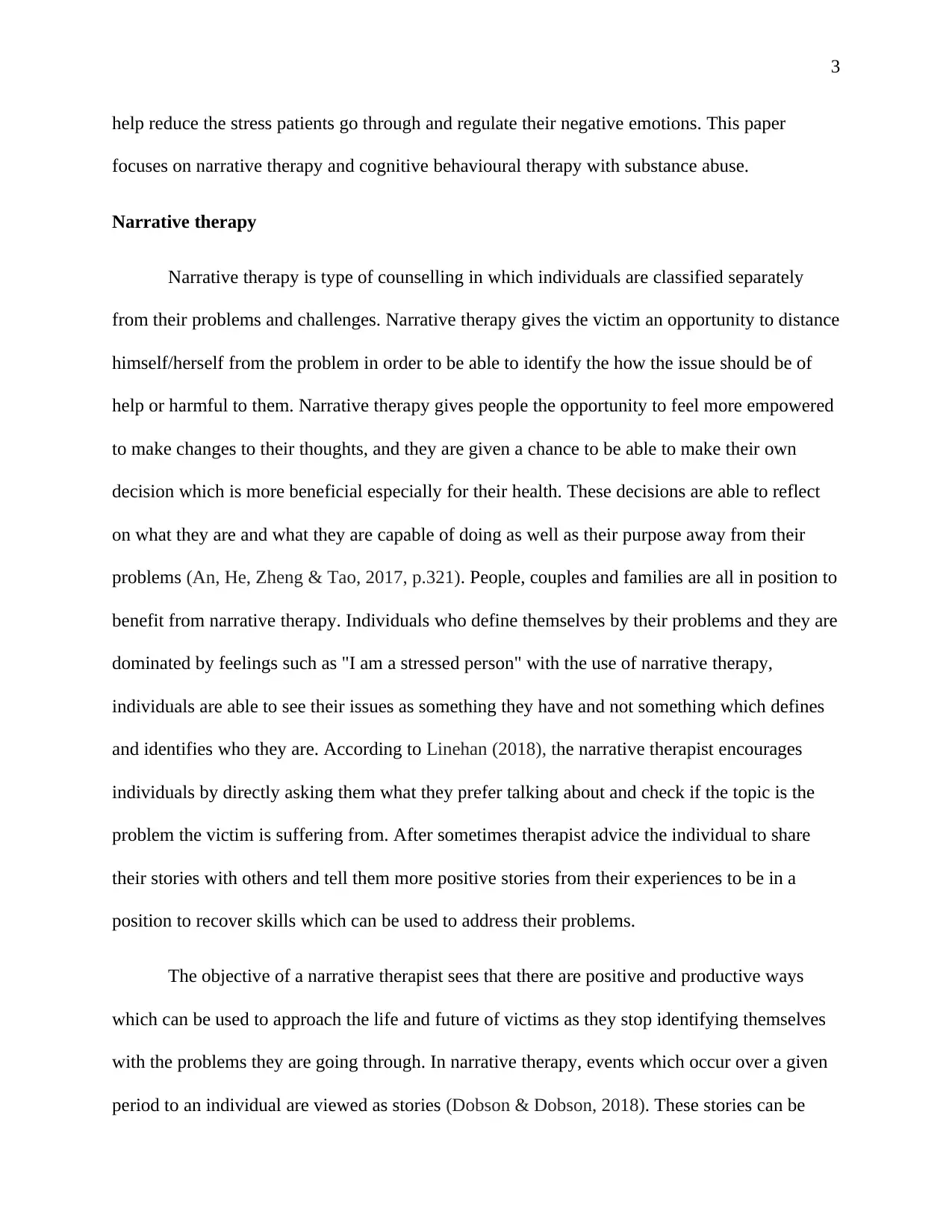
3
help reduce the stress patients go through and regulate their negative emotions. This paper
focuses on narrative therapy and cognitive behavioural therapy with substance abuse.
Narrative therapy
Narrative therapy is type of counselling in which individuals are classified separately
from their problems and challenges. Narrative therapy gives the victim an opportunity to distance
himself/herself from the problem in order to be able to identify the how the issue should be of
help or harmful to them. Narrative therapy gives people the opportunity to feel more empowered
to make changes to their thoughts, and they are given a chance to be able to make their own
decision which is more beneficial especially for their health. These decisions are able to reflect
on what they are and what they are capable of doing as well as their purpose away from their
problems (An, He, Zheng & Tao, 2017, p.321). People, couples and families are all in position to
benefit from narrative therapy. Individuals who define themselves by their problems and they are
dominated by feelings such as "I am a stressed person" with the use of narrative therapy,
individuals are able to see their issues as something they have and not something which defines
and identifies who they are. According to Linehan (2018), the narrative therapist encourages
individuals by directly asking them what they prefer talking about and check if the topic is the
problem the victim is suffering from. After sometimes therapist advice the individual to share
their stories with others and tell them more positive stories from their experiences to be in a
position to recover skills which can be used to address their problems.
The objective of a narrative therapist sees that there are positive and productive ways
which can be used to approach the life and future of victims as they stop identifying themselves
with the problems they are going through. In narrative therapy, events which occur over a given
period to an individual are viewed as stories (Dobson & Dobson, 2018). These stories can be
help reduce the stress patients go through and regulate their negative emotions. This paper
focuses on narrative therapy and cognitive behavioural therapy with substance abuse.
Narrative therapy
Narrative therapy is type of counselling in which individuals are classified separately
from their problems and challenges. Narrative therapy gives the victim an opportunity to distance
himself/herself from the problem in order to be able to identify the how the issue should be of
help or harmful to them. Narrative therapy gives people the opportunity to feel more empowered
to make changes to their thoughts, and they are given a chance to be able to make their own
decision which is more beneficial especially for their health. These decisions are able to reflect
on what they are and what they are capable of doing as well as their purpose away from their
problems (An, He, Zheng & Tao, 2017, p.321). People, couples and families are all in position to
benefit from narrative therapy. Individuals who define themselves by their problems and they are
dominated by feelings such as "I am a stressed person" with the use of narrative therapy,
individuals are able to see their issues as something they have and not something which defines
and identifies who they are. According to Linehan (2018), the narrative therapist encourages
individuals by directly asking them what they prefer talking about and check if the topic is the
problem the victim is suffering from. After sometimes therapist advice the individual to share
their stories with others and tell them more positive stories from their experiences to be in a
position to recover skills which can be used to address their problems.
The objective of a narrative therapist sees that there are positive and productive ways
which can be used to approach the life and future of victims as they stop identifying themselves
with the problems they are going through. In narrative therapy, events which occur over a given
period to an individual are viewed as stories (Dobson & Dobson, 2018). These stories can be
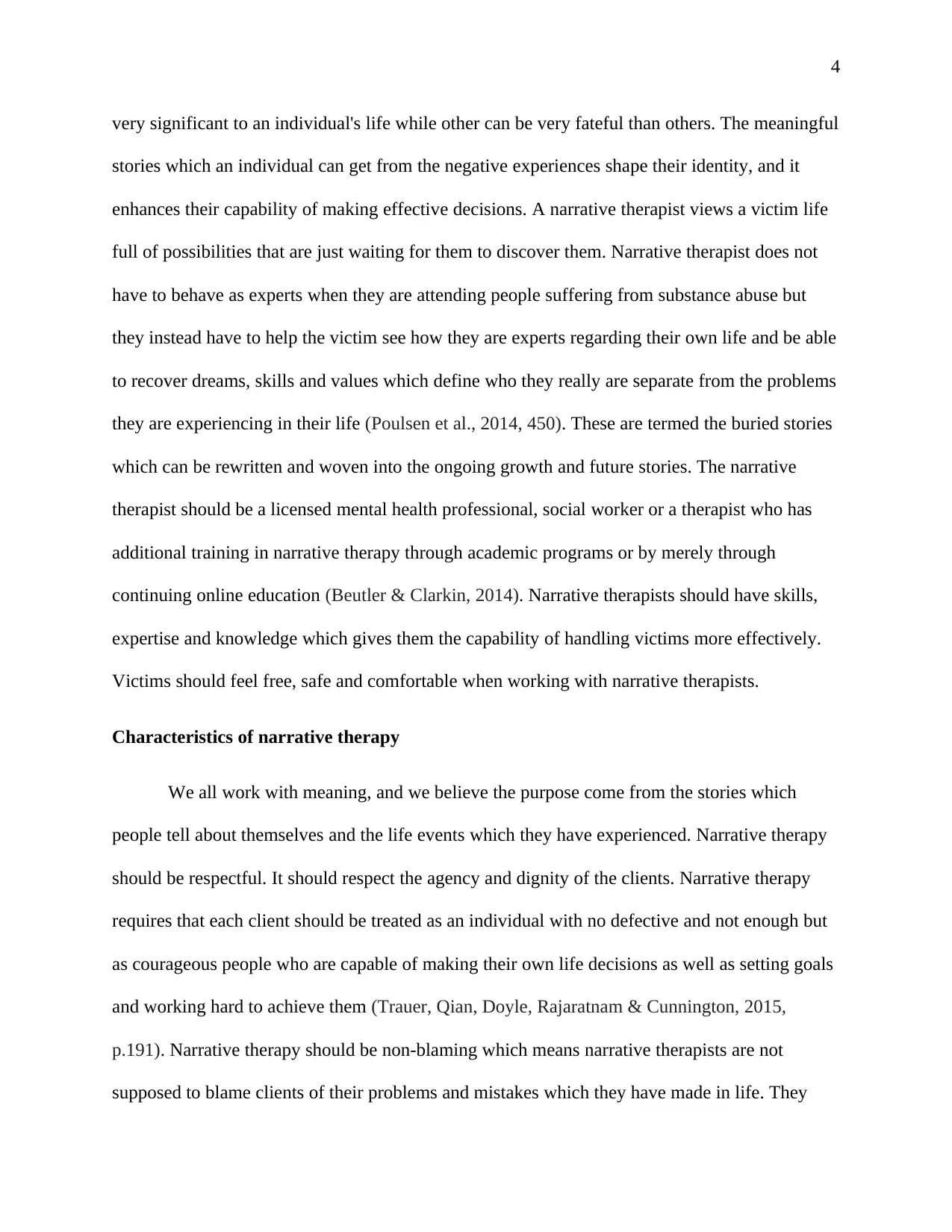
4
very significant to an individual's life while other can be very fateful than others. The meaningful
stories which an individual can get from the negative experiences shape their identity, and it
enhances their capability of making effective decisions. A narrative therapist views a victim life
full of possibilities that are just waiting for them to discover them. Narrative therapist does not
have to behave as experts when they are attending people suffering from substance abuse but
they instead have to help the victim see how they are experts regarding their own life and be able
to recover dreams, skills and values which define who they really are separate from the problems
they are experiencing in their life (Poulsen et al., 2014, 450). These are termed the buried stories
which can be rewritten and woven into the ongoing growth and future stories. The narrative
therapist should be a licensed mental health professional, social worker or a therapist who has
additional training in narrative therapy through academic programs or by merely through
continuing online education (Beutler & Clarkin, 2014). Narrative therapists should have skills,
expertise and knowledge which gives them the capability of handling victims more effectively.
Victims should feel free, safe and comfortable when working with narrative therapists.
Characteristics of narrative therapy
We all work with meaning, and we believe the purpose come from the stories which
people tell about themselves and the life events which they have experienced. Narrative therapy
should be respectful. It should respect the agency and dignity of the clients. Narrative therapy
requires that each client should be treated as an individual with no defective and not enough but
as courageous people who are capable of making their own life decisions as well as setting goals
and working hard to achieve them (Trauer, Qian, Doyle, Rajaratnam & Cunnington, 2015,
p.191). Narrative therapy should be non-blaming which means narrative therapists are not
supposed to blame clients of their problems and mistakes which they have made in life. They
very significant to an individual's life while other can be very fateful than others. The meaningful
stories which an individual can get from the negative experiences shape their identity, and it
enhances their capability of making effective decisions. A narrative therapist views a victim life
full of possibilities that are just waiting for them to discover them. Narrative therapist does not
have to behave as experts when they are attending people suffering from substance abuse but
they instead have to help the victim see how they are experts regarding their own life and be able
to recover dreams, skills and values which define who they really are separate from the problems
they are experiencing in their life (Poulsen et al., 2014, 450). These are termed the buried stories
which can be rewritten and woven into the ongoing growth and future stories. The narrative
therapist should be a licensed mental health professional, social worker or a therapist who has
additional training in narrative therapy through academic programs or by merely through
continuing online education (Beutler & Clarkin, 2014). Narrative therapists should have skills,
expertise and knowledge which gives them the capability of handling victims more effectively.
Victims should feel free, safe and comfortable when working with narrative therapists.
Characteristics of narrative therapy
We all work with meaning, and we believe the purpose come from the stories which
people tell about themselves and the life events which they have experienced. Narrative therapy
should be respectful. It should respect the agency and dignity of the clients. Narrative therapy
requires that each client should be treated as an individual with no defective and not enough but
as courageous people who are capable of making their own life decisions as well as setting goals
and working hard to achieve them (Trauer, Qian, Doyle, Rajaratnam & Cunnington, 2015,
p.191). Narrative therapy should be non-blaming which means narrative therapists are not
supposed to blame clients of their problems and mistakes which they have made in life. They
Secure Best Marks with AI Grader
Need help grading? Try our AI Grader for instant feedback on your assignments.
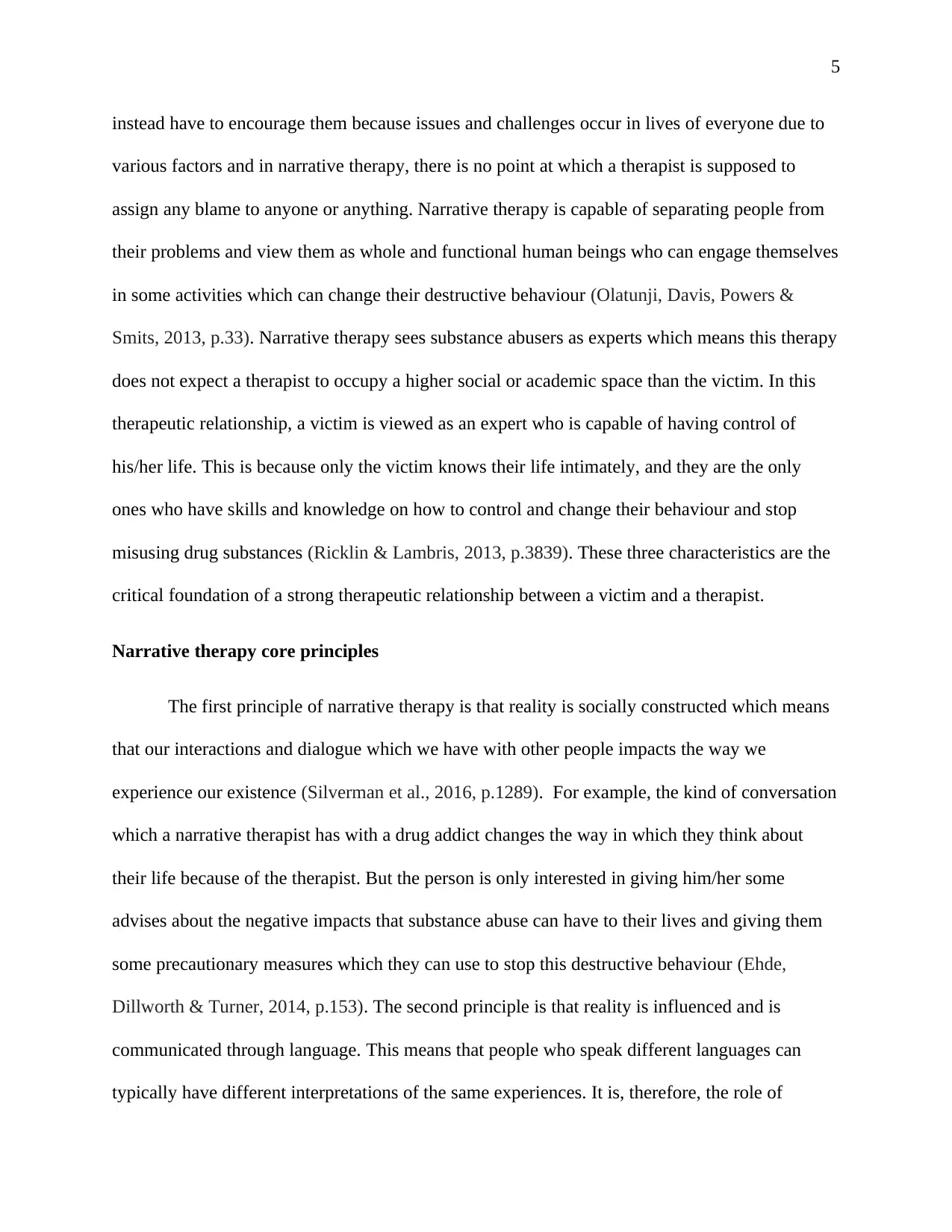
5
instead have to encourage them because issues and challenges occur in lives of everyone due to
various factors and in narrative therapy, there is no point at which a therapist is supposed to
assign any blame to anyone or anything. Narrative therapy is capable of separating people from
their problems and view them as whole and functional human beings who can engage themselves
in some activities which can change their destructive behaviour (Olatunji, Davis, Powers &
Smits, 2013, p.33). Narrative therapy sees substance abusers as experts which means this therapy
does not expect a therapist to occupy a higher social or academic space than the victim. In this
therapeutic relationship, a victim is viewed as an expert who is capable of having control of
his/her life. This is because only the victim knows their life intimately, and they are the only
ones who have skills and knowledge on how to control and change their behaviour and stop
misusing drug substances (Ricklin & Lambris, 2013, p.3839). These three characteristics are the
critical foundation of a strong therapeutic relationship between a victim and a therapist.
Narrative therapy core principles
The first principle of narrative therapy is that reality is socially constructed which means
that our interactions and dialogue which we have with other people impacts the way we
experience our existence (Silverman et al., 2016, p.1289). For example, the kind of conversation
which a narrative therapist has with a drug addict changes the way in which they think about
their life because of the therapist. But the person is only interested in giving him/her some
advises about the negative impacts that substance abuse can have to their lives and giving them
some precautionary measures which they can use to stop this destructive behaviour (Ehde,
Dillworth & Turner, 2014, p.153). The second principle is that reality is influenced and is
communicated through language. This means that people who speak different languages can
typically have different interpretations of the same experiences. It is, therefore, the role of
instead have to encourage them because issues and challenges occur in lives of everyone due to
various factors and in narrative therapy, there is no point at which a therapist is supposed to
assign any blame to anyone or anything. Narrative therapy is capable of separating people from
their problems and view them as whole and functional human beings who can engage themselves
in some activities which can change their destructive behaviour (Olatunji, Davis, Powers &
Smits, 2013, p.33). Narrative therapy sees substance abusers as experts which means this therapy
does not expect a therapist to occupy a higher social or academic space than the victim. In this
therapeutic relationship, a victim is viewed as an expert who is capable of having control of
his/her life. This is because only the victim knows their life intimately, and they are the only
ones who have skills and knowledge on how to control and change their behaviour and stop
misusing drug substances (Ricklin & Lambris, 2013, p.3839). These three characteristics are the
critical foundation of a strong therapeutic relationship between a victim and a therapist.
Narrative therapy core principles
The first principle of narrative therapy is that reality is socially constructed which means
that our interactions and dialogue which we have with other people impacts the way we
experience our existence (Silverman et al., 2016, p.1289). For example, the kind of conversation
which a narrative therapist has with a drug addict changes the way in which they think about
their life because of the therapist. But the person is only interested in giving him/her some
advises about the negative impacts that substance abuse can have to their lives and giving them
some precautionary measures which they can use to stop this destructive behaviour (Ehde,
Dillworth & Turner, 2014, p.153). The second principle is that reality is influenced and is
communicated through language. This means that people who speak different languages can
typically have different interpretations of the same experiences. It is, therefore, the role of
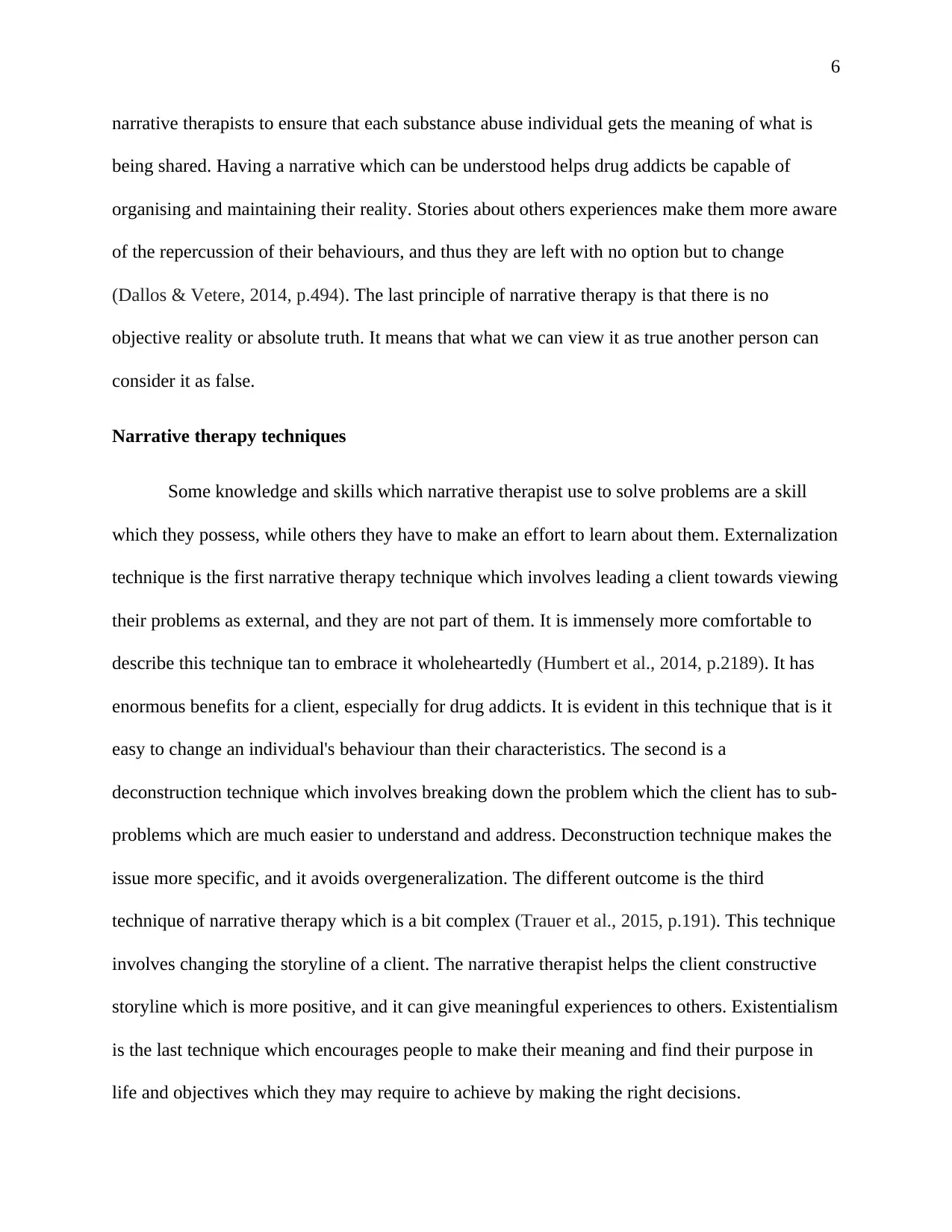
6
narrative therapists to ensure that each substance abuse individual gets the meaning of what is
being shared. Having a narrative which can be understood helps drug addicts be capable of
organising and maintaining their reality. Stories about others experiences make them more aware
of the repercussion of their behaviours, and thus they are left with no option but to change
(Dallos & Vetere, 2014, p.494). The last principle of narrative therapy is that there is no
objective reality or absolute truth. It means that what we can view it as true another person can
consider it as false.
Narrative therapy techniques
Some knowledge and skills which narrative therapist use to solve problems are a skill
which they possess, while others they have to make an effort to learn about them. Externalization
technique is the first narrative therapy technique which involves leading a client towards viewing
their problems as external, and they are not part of them. It is immensely more comfortable to
describe this technique tan to embrace it wholeheartedly (Humbert et al., 2014, p.2189). It has
enormous benefits for a client, especially for drug addicts. It is evident in this technique that is it
easy to change an individual's behaviour than their characteristics. The second is a
deconstruction technique which involves breaking down the problem which the client has to sub-
problems which are much easier to understand and address. Deconstruction technique makes the
issue more specific, and it avoids overgeneralization. The different outcome is the third
technique of narrative therapy which is a bit complex (Trauer et al., 2015, p.191). This technique
involves changing the storyline of a client. The narrative therapist helps the client constructive
storyline which is more positive, and it can give meaningful experiences to others. Existentialism
is the last technique which encourages people to make their meaning and find their purpose in
life and objectives which they may require to achieve by making the right decisions.
narrative therapists to ensure that each substance abuse individual gets the meaning of what is
being shared. Having a narrative which can be understood helps drug addicts be capable of
organising and maintaining their reality. Stories about others experiences make them more aware
of the repercussion of their behaviours, and thus they are left with no option but to change
(Dallos & Vetere, 2014, p.494). The last principle of narrative therapy is that there is no
objective reality or absolute truth. It means that what we can view it as true another person can
consider it as false.
Narrative therapy techniques
Some knowledge and skills which narrative therapist use to solve problems are a skill
which they possess, while others they have to make an effort to learn about them. Externalization
technique is the first narrative therapy technique which involves leading a client towards viewing
their problems as external, and they are not part of them. It is immensely more comfortable to
describe this technique tan to embrace it wholeheartedly (Humbert et al., 2014, p.2189). It has
enormous benefits for a client, especially for drug addicts. It is evident in this technique that is it
easy to change an individual's behaviour than their characteristics. The second is a
deconstruction technique which involves breaking down the problem which the client has to sub-
problems which are much easier to understand and address. Deconstruction technique makes the
issue more specific, and it avoids overgeneralization. The different outcome is the third
technique of narrative therapy which is a bit complex (Trauer et al., 2015, p.191). This technique
involves changing the storyline of a client. The narrative therapist helps the client constructive
storyline which is more positive, and it can give meaningful experiences to others. Existentialism
is the last technique which encourages people to make their meaning and find their purpose in
life and objectives which they may require to achieve by making the right decisions.
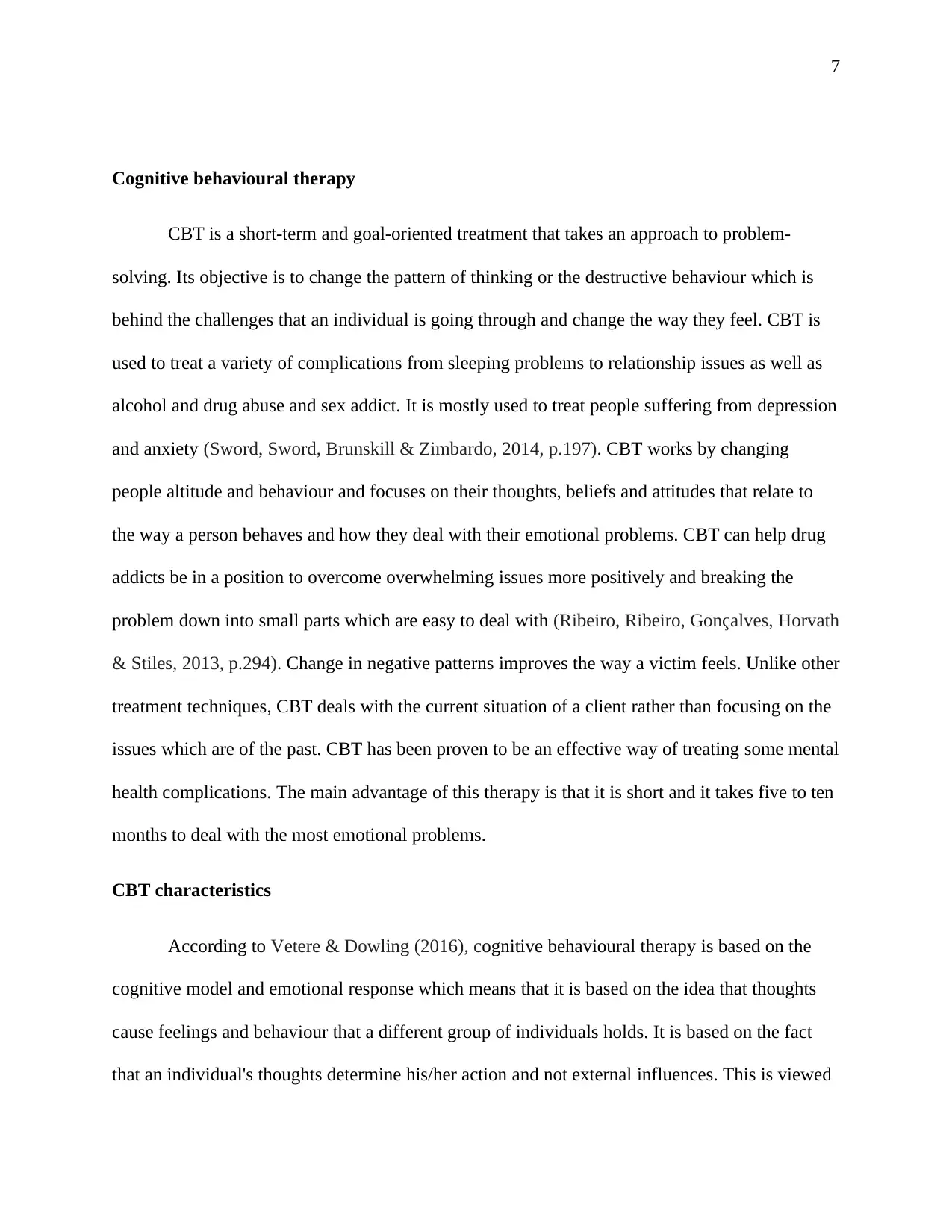
7
Cognitive behavioural therapy
CBT is a short-term and goal-oriented treatment that takes an approach to problem-
solving. Its objective is to change the pattern of thinking or the destructive behaviour which is
behind the challenges that an individual is going through and change the way they feel. CBT is
used to treat a variety of complications from sleeping problems to relationship issues as well as
alcohol and drug abuse and sex addict. It is mostly used to treat people suffering from depression
and anxiety (Sword, Sword, Brunskill & Zimbardo, 2014, p.197). CBT works by changing
people altitude and behaviour and focuses on their thoughts, beliefs and attitudes that relate to
the way a person behaves and how they deal with their emotional problems. CBT can help drug
addicts be in a position to overcome overwhelming issues more positively and breaking the
problem down into small parts which are easy to deal with (Ribeiro, Ribeiro, Gonçalves, Horvath
& Stiles, 2013, p.294). Change in negative patterns improves the way a victim feels. Unlike other
treatment techniques, CBT deals with the current situation of a client rather than focusing on the
issues which are of the past. CBT has been proven to be an effective way of treating some mental
health complications. The main advantage of this therapy is that it is short and it takes five to ten
months to deal with the most emotional problems.
CBT characteristics
According to Vetere & Dowling (2016), cognitive behavioural therapy is based on the
cognitive model and emotional response which means that it is based on the idea that thoughts
cause feelings and behaviour that a different group of individuals holds. It is based on the fact
that an individual's thoughts determine his/her action and not external influences. This is viewed
Cognitive behavioural therapy
CBT is a short-term and goal-oriented treatment that takes an approach to problem-
solving. Its objective is to change the pattern of thinking or the destructive behaviour which is
behind the challenges that an individual is going through and change the way they feel. CBT is
used to treat a variety of complications from sleeping problems to relationship issues as well as
alcohol and drug abuse and sex addict. It is mostly used to treat people suffering from depression
and anxiety (Sword, Sword, Brunskill & Zimbardo, 2014, p.197). CBT works by changing
people altitude and behaviour and focuses on their thoughts, beliefs and attitudes that relate to
the way a person behaves and how they deal with their emotional problems. CBT can help drug
addicts be in a position to overcome overwhelming issues more positively and breaking the
problem down into small parts which are easy to deal with (Ribeiro, Ribeiro, Gonçalves, Horvath
& Stiles, 2013, p.294). Change in negative patterns improves the way a victim feels. Unlike other
treatment techniques, CBT deals with the current situation of a client rather than focusing on the
issues which are of the past. CBT has been proven to be an effective way of treating some mental
health complications. The main advantage of this therapy is that it is short and it takes five to ten
months to deal with the most emotional problems.
CBT characteristics
According to Vetere & Dowling (2016), cognitive behavioural therapy is based on the
cognitive model and emotional response which means that it is based on the idea that thoughts
cause feelings and behaviour that a different group of individuals holds. It is based on the fact
that an individual's thoughts determine his/her action and not external influences. This is viewed
Paraphrase This Document
Need a fresh take? Get an instant paraphrase of this document with our AI Paraphraser
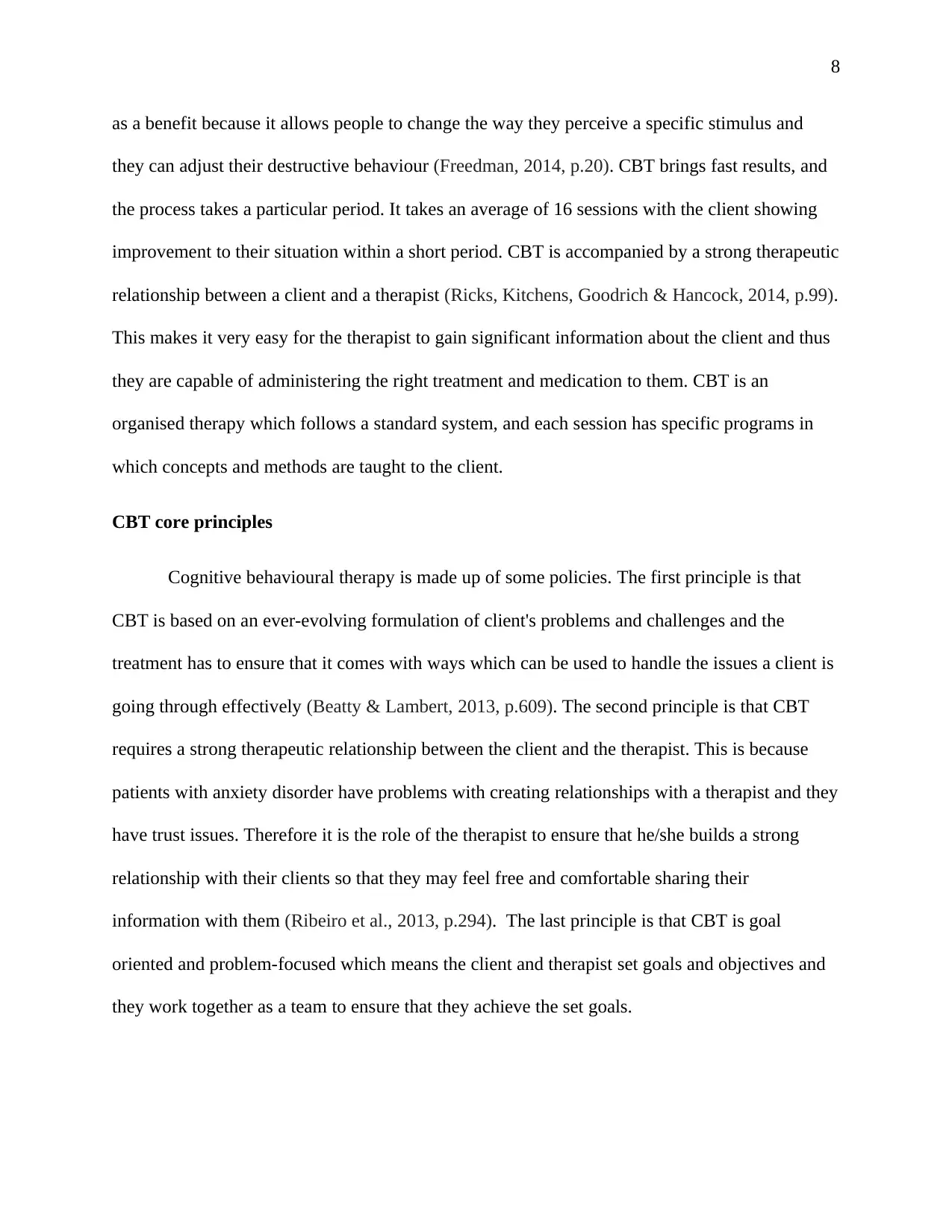
8
as a benefit because it allows people to change the way they perceive a specific stimulus and
they can adjust their destructive behaviour (Freedman, 2014, p.20). CBT brings fast results, and
the process takes a particular period. It takes an average of 16 sessions with the client showing
improvement to their situation within a short period. CBT is accompanied by a strong therapeutic
relationship between a client and a therapist (Ricks, Kitchens, Goodrich & Hancock, 2014, p.99).
This makes it very easy for the therapist to gain significant information about the client and thus
they are capable of administering the right treatment and medication to them. CBT is an
organised therapy which follows a standard system, and each session has specific programs in
which concepts and methods are taught to the client.
CBT core principles
Cognitive behavioural therapy is made up of some policies. The first principle is that
CBT is based on an ever-evolving formulation of client's problems and challenges and the
treatment has to ensure that it comes with ways which can be used to handle the issues a client is
going through effectively (Beatty & Lambert, 2013, p.609). The second principle is that CBT
requires a strong therapeutic relationship between the client and the therapist. This is because
patients with anxiety disorder have problems with creating relationships with a therapist and they
have trust issues. Therefore it is the role of the therapist to ensure that he/she builds a strong
relationship with their clients so that they may feel free and comfortable sharing their
information with them (Ribeiro et al., 2013, p.294). The last principle is that CBT is goal
oriented and problem-focused which means the client and therapist set goals and objectives and
they work together as a team to ensure that they achieve the set goals.
as a benefit because it allows people to change the way they perceive a specific stimulus and
they can adjust their destructive behaviour (Freedman, 2014, p.20). CBT brings fast results, and
the process takes a particular period. It takes an average of 16 sessions with the client showing
improvement to their situation within a short period. CBT is accompanied by a strong therapeutic
relationship between a client and a therapist (Ricks, Kitchens, Goodrich & Hancock, 2014, p.99).
This makes it very easy for the therapist to gain significant information about the client and thus
they are capable of administering the right treatment and medication to them. CBT is an
organised therapy which follows a standard system, and each session has specific programs in
which concepts and methods are taught to the client.
CBT core principles
Cognitive behavioural therapy is made up of some policies. The first principle is that
CBT is based on an ever-evolving formulation of client's problems and challenges and the
treatment has to ensure that it comes with ways which can be used to handle the issues a client is
going through effectively (Beatty & Lambert, 2013, p.609). The second principle is that CBT
requires a strong therapeutic relationship between the client and the therapist. This is because
patients with anxiety disorder have problems with creating relationships with a therapist and they
have trust issues. Therefore it is the role of the therapist to ensure that he/she builds a strong
relationship with their clients so that they may feel free and comfortable sharing their
information with them (Ribeiro et al., 2013, p.294). The last principle is that CBT is goal
oriented and problem-focused which means the client and therapist set goals and objectives and
they work together as a team to ensure that they achieve the set goals.
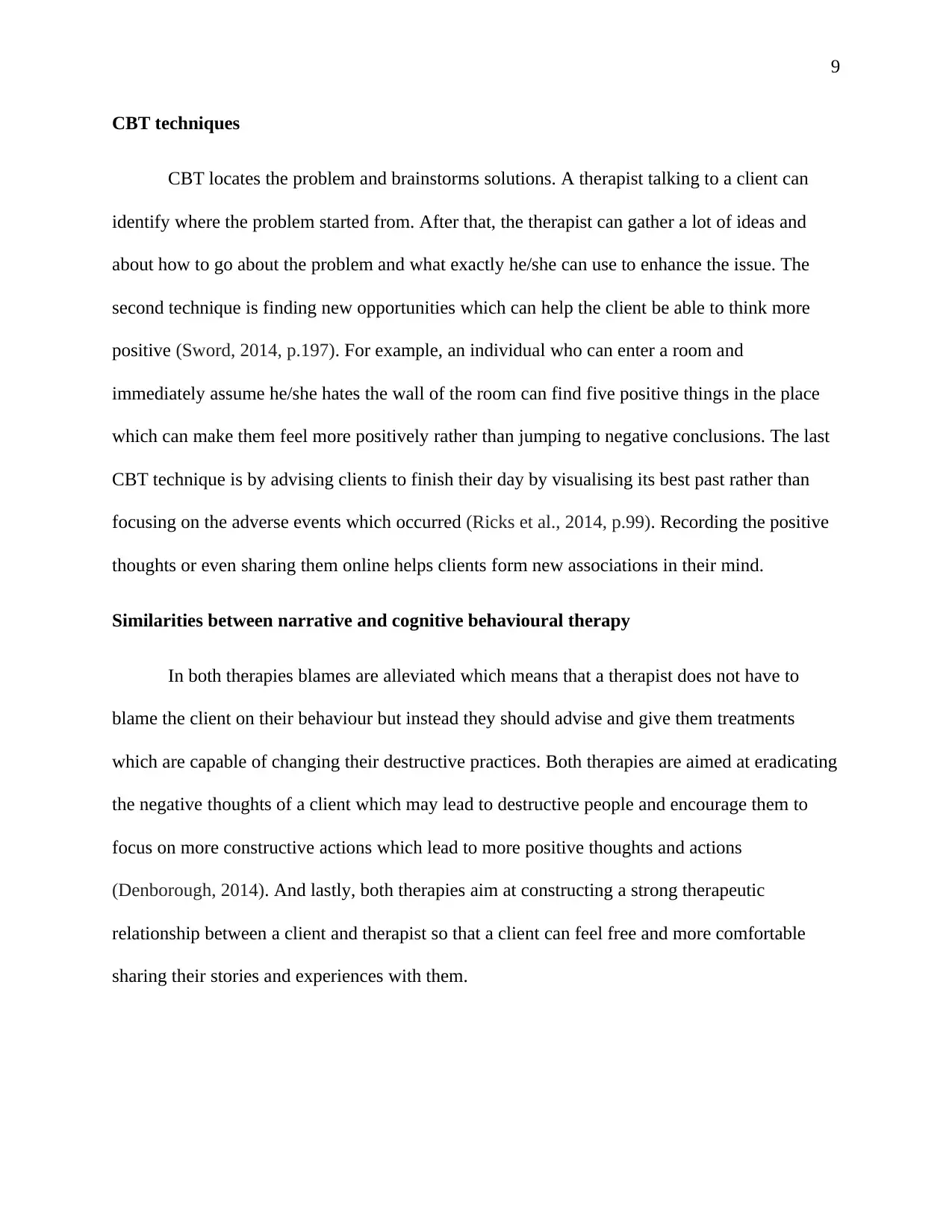
9
CBT techniques
CBT locates the problem and brainstorms solutions. A therapist talking to a client can
identify where the problem started from. After that, the therapist can gather a lot of ideas and
about how to go about the problem and what exactly he/she can use to enhance the issue. The
second technique is finding new opportunities which can help the client be able to think more
positive (Sword, 2014, p.197). For example, an individual who can enter a room and
immediately assume he/she hates the wall of the room can find five positive things in the place
which can make them feel more positively rather than jumping to negative conclusions. The last
CBT technique is by advising clients to finish their day by visualising its best past rather than
focusing on the adverse events which occurred (Ricks et al., 2014, p.99). Recording the positive
thoughts or even sharing them online helps clients form new associations in their mind.
Similarities between narrative and cognitive behavioural therapy
In both therapies blames are alleviated which means that a therapist does not have to
blame the client on their behaviour but instead they should advise and give them treatments
which are capable of changing their destructive practices. Both therapies are aimed at eradicating
the negative thoughts of a client which may lead to destructive people and encourage them to
focus on more constructive actions which lead to more positive thoughts and actions
(Denborough, 2014). And lastly, both therapies aim at constructing a strong therapeutic
relationship between a client and therapist so that a client can feel free and more comfortable
sharing their stories and experiences with them.
CBT techniques
CBT locates the problem and brainstorms solutions. A therapist talking to a client can
identify where the problem started from. After that, the therapist can gather a lot of ideas and
about how to go about the problem and what exactly he/she can use to enhance the issue. The
second technique is finding new opportunities which can help the client be able to think more
positive (Sword, 2014, p.197). For example, an individual who can enter a room and
immediately assume he/she hates the wall of the room can find five positive things in the place
which can make them feel more positively rather than jumping to negative conclusions. The last
CBT technique is by advising clients to finish their day by visualising its best past rather than
focusing on the adverse events which occurred (Ricks et al., 2014, p.99). Recording the positive
thoughts or even sharing them online helps clients form new associations in their mind.
Similarities between narrative and cognitive behavioural therapy
In both therapies blames are alleviated which means that a therapist does not have to
blame the client on their behaviour but instead they should advise and give them treatments
which are capable of changing their destructive practices. Both therapies are aimed at eradicating
the negative thoughts of a client which may lead to destructive people and encourage them to
focus on more constructive actions which lead to more positive thoughts and actions
(Denborough, 2014). And lastly, both therapies aim at constructing a strong therapeutic
relationship between a client and therapist so that a client can feel free and more comfortable
sharing their stories and experiences with them.
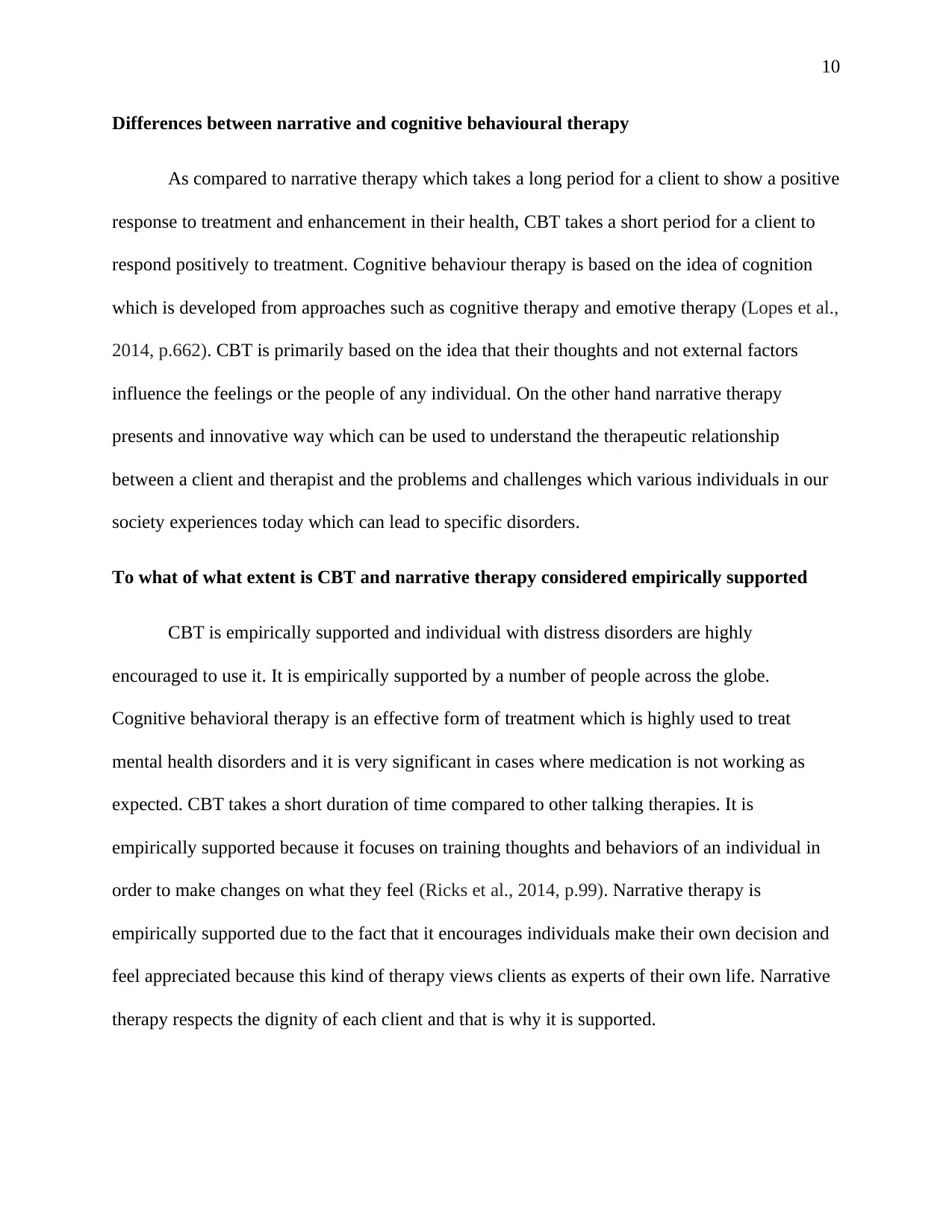
10
Differences between narrative and cognitive behavioural therapy
As compared to narrative therapy which takes a long period for a client to show a positive
response to treatment and enhancement in their health, CBT takes a short period for a client to
respond positively to treatment. Cognitive behaviour therapy is based on the idea of cognition
which is developed from approaches such as cognitive therapy and emotive therapy (Lopes et al.,
2014, p.662). CBT is primarily based on the idea that their thoughts and not external factors
influence the feelings or the people of any individual. On the other hand narrative therapy
presents and innovative way which can be used to understand the therapeutic relationship
between a client and therapist and the problems and challenges which various individuals in our
society experiences today which can lead to specific disorders.
To what of what extent is CBT and narrative therapy considered empirically supported
CBT is empirically supported and individual with distress disorders are highly
encouraged to use it. It is empirically supported by a number of people across the globe.
Cognitive behavioral therapy is an effective form of treatment which is highly used to treat
mental health disorders and it is very significant in cases where medication is not working as
expected. CBT takes a short duration of time compared to other talking therapies. It is
empirically supported because it focuses on training thoughts and behaviors of an individual in
order to make changes on what they feel (Ricks et al., 2014, p.99). Narrative therapy is
empirically supported due to the fact that it encourages individuals make their own decision and
feel appreciated because this kind of therapy views clients as experts of their own life. Narrative
therapy respects the dignity of each client and that is why it is supported.
Differences between narrative and cognitive behavioural therapy
As compared to narrative therapy which takes a long period for a client to show a positive
response to treatment and enhancement in their health, CBT takes a short period for a client to
respond positively to treatment. Cognitive behaviour therapy is based on the idea of cognition
which is developed from approaches such as cognitive therapy and emotive therapy (Lopes et al.,
2014, p.662). CBT is primarily based on the idea that their thoughts and not external factors
influence the feelings or the people of any individual. On the other hand narrative therapy
presents and innovative way which can be used to understand the therapeutic relationship
between a client and therapist and the problems and challenges which various individuals in our
society experiences today which can lead to specific disorders.
To what of what extent is CBT and narrative therapy considered empirically supported
CBT is empirically supported and individual with distress disorders are highly
encouraged to use it. It is empirically supported by a number of people across the globe.
Cognitive behavioral therapy is an effective form of treatment which is highly used to treat
mental health disorders and it is very significant in cases where medication is not working as
expected. CBT takes a short duration of time compared to other talking therapies. It is
empirically supported because it focuses on training thoughts and behaviors of an individual in
order to make changes on what they feel (Ricks et al., 2014, p.99). Narrative therapy is
empirically supported due to the fact that it encourages individuals make their own decision and
feel appreciated because this kind of therapy views clients as experts of their own life. Narrative
therapy respects the dignity of each client and that is why it is supported.
Secure Best Marks with AI Grader
Need help grading? Try our AI Grader for instant feedback on your assignments.
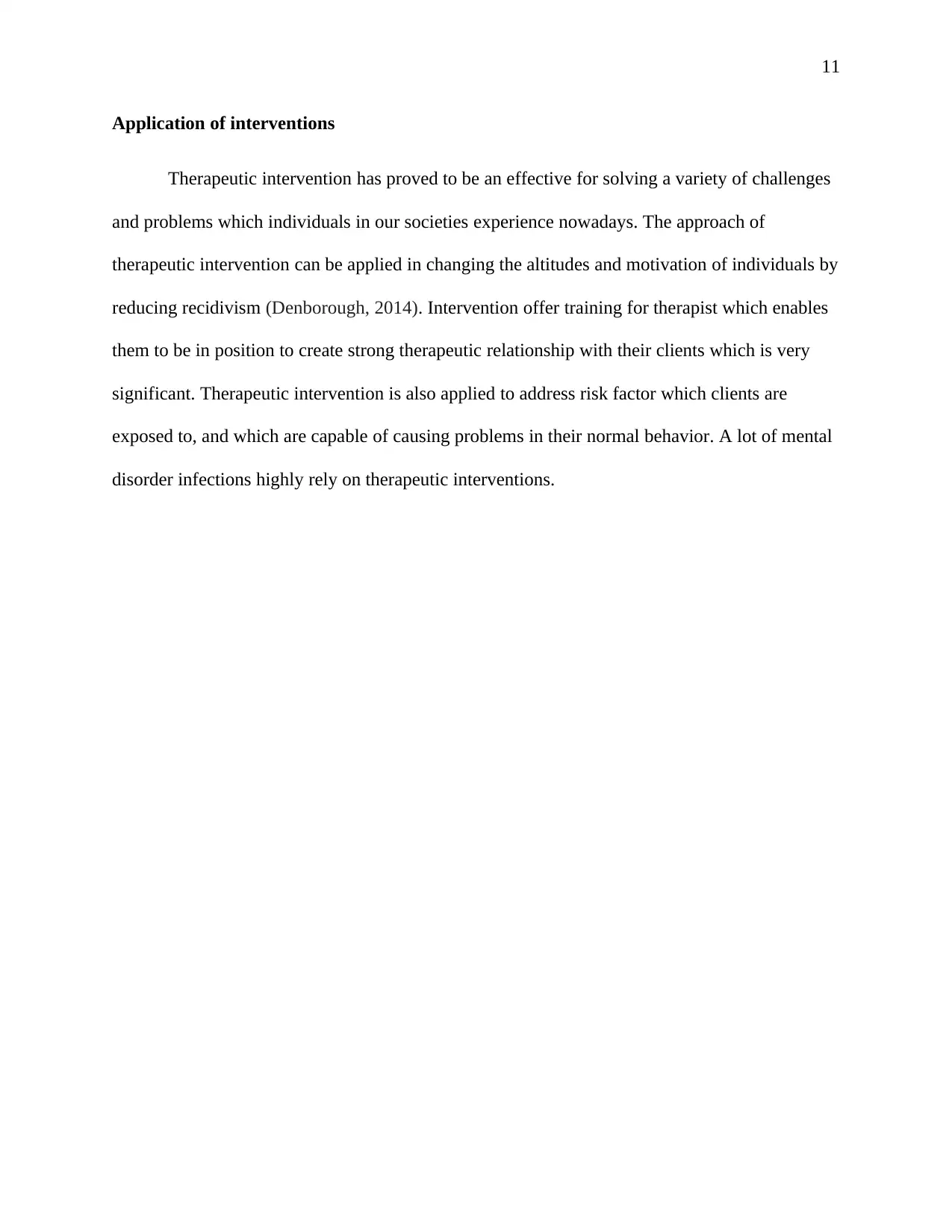
11
Application of interventions
Therapeutic intervention has proved to be an effective for solving a variety of challenges
and problems which individuals in our societies experience nowadays. The approach of
therapeutic intervention can be applied in changing the altitudes and motivation of individuals by
reducing recidivism (Denborough, 2014). Intervention offer training for therapist which enables
them to be in position to create strong therapeutic relationship with their clients which is very
significant. Therapeutic intervention is also applied to address risk factor which clients are
exposed to, and which are capable of causing problems in their normal behavior. A lot of mental
disorder infections highly rely on therapeutic interventions.
Application of interventions
Therapeutic intervention has proved to be an effective for solving a variety of challenges
and problems which individuals in our societies experience nowadays. The approach of
therapeutic intervention can be applied in changing the altitudes and motivation of individuals by
reducing recidivism (Denborough, 2014). Intervention offer training for therapist which enables
them to be in position to create strong therapeutic relationship with their clients which is very
significant. Therapeutic intervention is also applied to address risk factor which clients are
exposed to, and which are capable of causing problems in their normal behavior. A lot of mental
disorder infections highly rely on therapeutic interventions.
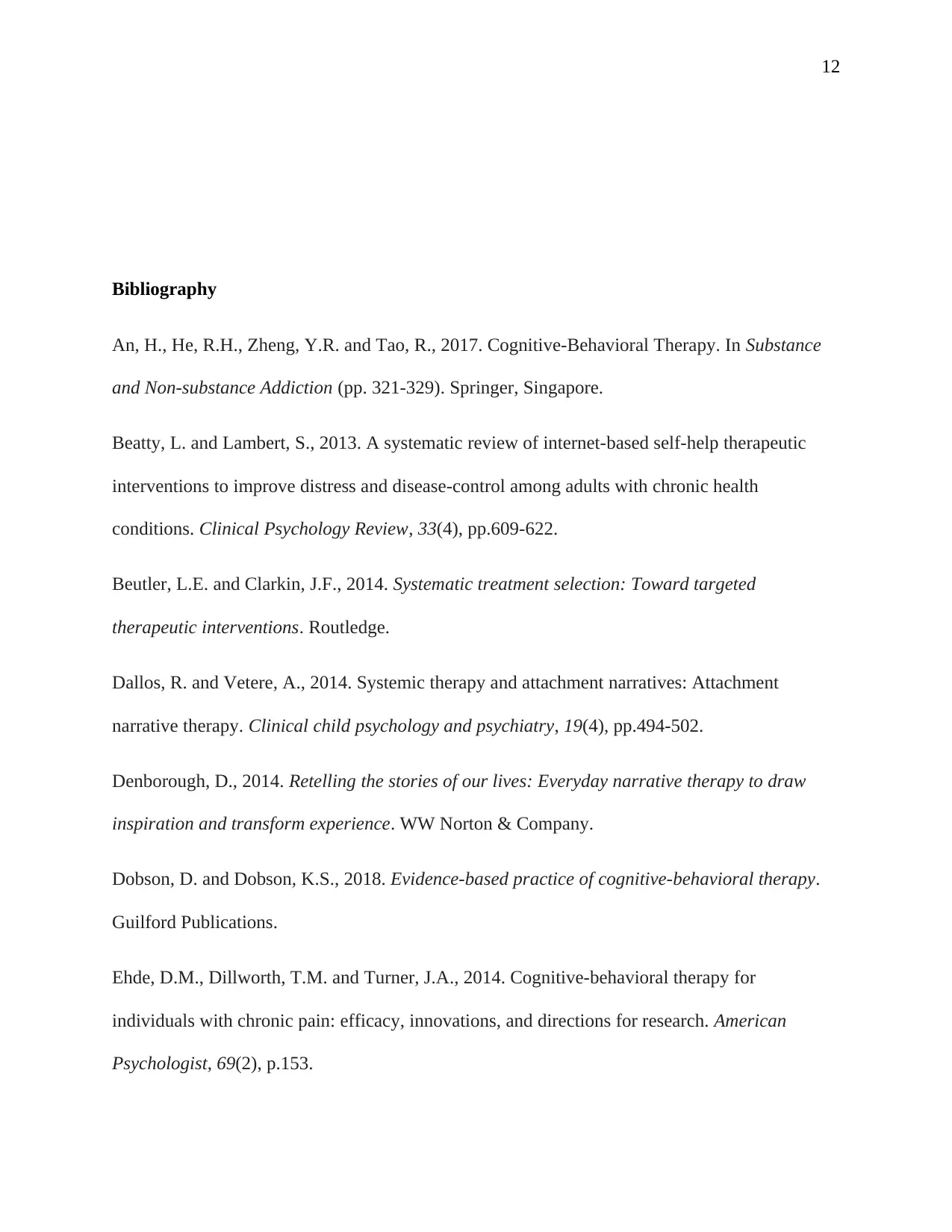
12
Bibliography
An, H., He, R.H., Zheng, Y.R. and Tao, R., 2017. Cognitive-Behavioral Therapy. In Substance
and Non-substance Addiction (pp. 321-329). Springer, Singapore.
Beatty, L. and Lambert, S., 2013. A systematic review of internet-based self-help therapeutic
interventions to improve distress and disease-control among adults with chronic health
conditions. Clinical Psychology Review, 33(4), pp.609-622.
Beutler, L.E. and Clarkin, J.F., 2014. Systematic treatment selection: Toward targeted
therapeutic interventions. Routledge.
Dallos, R. and Vetere, A., 2014. Systemic therapy and attachment narratives: Attachment
narrative therapy. Clinical child psychology and psychiatry, 19(4), pp.494-502.
Denborough, D., 2014. Retelling the stories of our lives: Everyday narrative therapy to draw
inspiration and transform experience. WW Norton & Company.
Dobson, D. and Dobson, K.S., 2018. Evidence-based practice of cognitive-behavioral therapy.
Guilford Publications.
Ehde, D.M., Dillworth, T.M. and Turner, J.A., 2014. Cognitive-behavioral therapy for
individuals with chronic pain: efficacy, innovations, and directions for research. American
Psychologist, 69(2), p.153.
Bibliography
An, H., He, R.H., Zheng, Y.R. and Tao, R., 2017. Cognitive-Behavioral Therapy. In Substance
and Non-substance Addiction (pp. 321-329). Springer, Singapore.
Beatty, L. and Lambert, S., 2013. A systematic review of internet-based self-help therapeutic
interventions to improve distress and disease-control among adults with chronic health
conditions. Clinical Psychology Review, 33(4), pp.609-622.
Beutler, L.E. and Clarkin, J.F., 2014. Systematic treatment selection: Toward targeted
therapeutic interventions. Routledge.
Dallos, R. and Vetere, A., 2014. Systemic therapy and attachment narratives: Attachment
narrative therapy. Clinical child psychology and psychiatry, 19(4), pp.494-502.
Denborough, D., 2014. Retelling the stories of our lives: Everyday narrative therapy to draw
inspiration and transform experience. WW Norton & Company.
Dobson, D. and Dobson, K.S., 2018. Evidence-based practice of cognitive-behavioral therapy.
Guilford Publications.
Ehde, D.M., Dillworth, T.M. and Turner, J.A., 2014. Cognitive-behavioral therapy for
individuals with chronic pain: efficacy, innovations, and directions for research. American
Psychologist, 69(2), p.153.
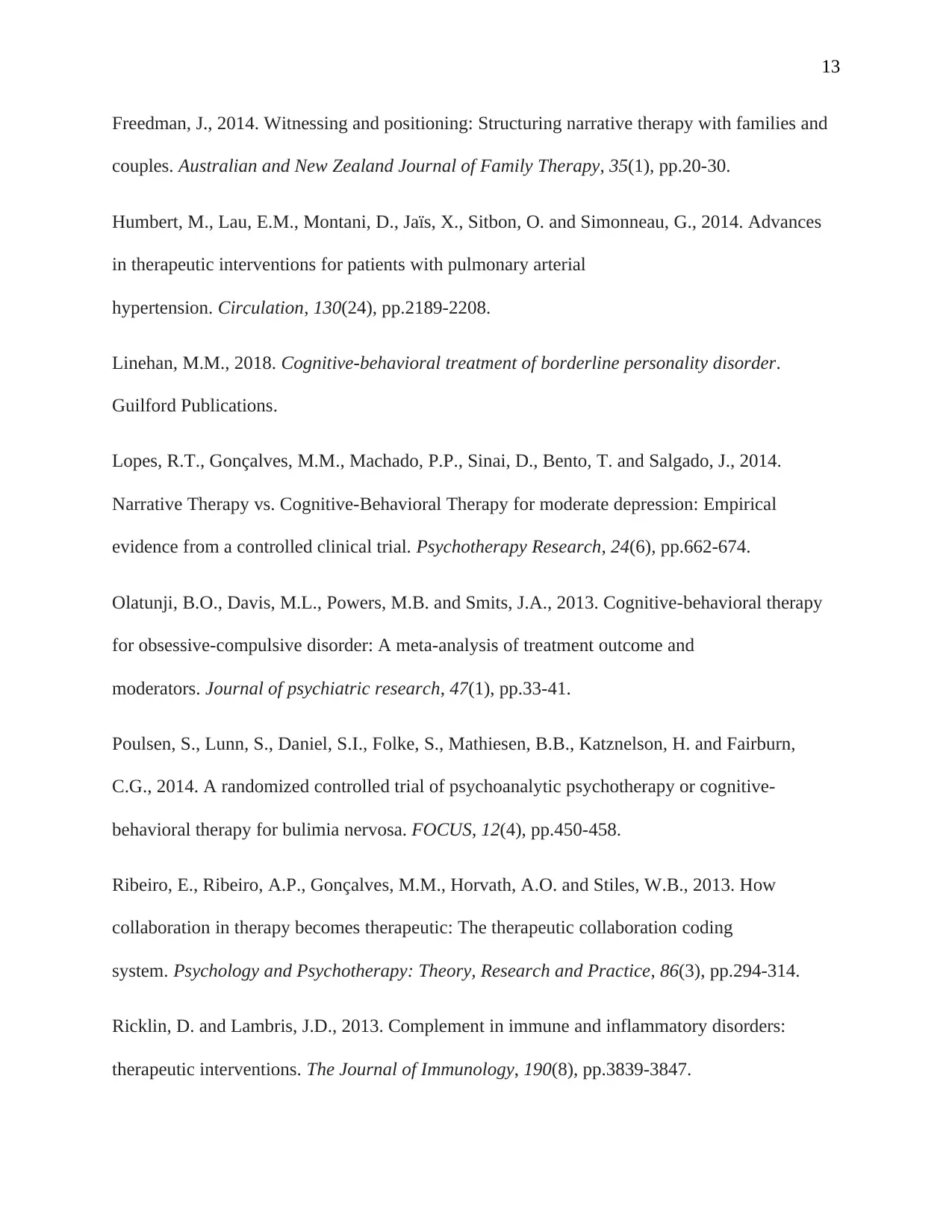
13
Freedman, J., 2014. Witnessing and positioning: Structuring narrative therapy with families and
couples. Australian and New Zealand Journal of Family Therapy, 35(1), pp.20-30.
Humbert, M., Lau, E.M., Montani, D., Jaïs, X., Sitbon, O. and Simonneau, G., 2014. Advances
in therapeutic interventions for patients with pulmonary arterial
hypertension. Circulation, 130(24), pp.2189-2208.
Linehan, M.M., 2018. Cognitive-behavioral treatment of borderline personality disorder.
Guilford Publications.
Lopes, R.T., Gonçalves, M.M., Machado, P.P., Sinai, D., Bento, T. and Salgado, J., 2014.
Narrative Therapy vs. Cognitive-Behavioral Therapy for moderate depression: Empirical
evidence from a controlled clinical trial. Psychotherapy Research, 24(6), pp.662-674.
Olatunji, B.O., Davis, M.L., Powers, M.B. and Smits, J.A., 2013. Cognitive-behavioral therapy
for obsessive-compulsive disorder: A meta-analysis of treatment outcome and
moderators. Journal of psychiatric research, 47(1), pp.33-41.
Poulsen, S., Lunn, S., Daniel, S.I., Folke, S., Mathiesen, B.B., Katznelson, H. and Fairburn,
C.G., 2014. A randomized controlled trial of psychoanalytic psychotherapy or cognitive-
behavioral therapy for bulimia nervosa. FOCUS, 12(4), pp.450-458.
Ribeiro, E., Ribeiro, A.P., Gonçalves, M.M., Horvath, A.O. and Stiles, W.B., 2013. How
collaboration in therapy becomes therapeutic: The therapeutic collaboration coding
system. Psychology and Psychotherapy: Theory, Research and Practice, 86(3), pp.294-314.
Ricklin, D. and Lambris, J.D., 2013. Complement in immune and inflammatory disorders:
therapeutic interventions. The Journal of Immunology, 190(8), pp.3839-3847.
Freedman, J., 2014. Witnessing and positioning: Structuring narrative therapy with families and
couples. Australian and New Zealand Journal of Family Therapy, 35(1), pp.20-30.
Humbert, M., Lau, E.M., Montani, D., Jaïs, X., Sitbon, O. and Simonneau, G., 2014. Advances
in therapeutic interventions for patients with pulmonary arterial
hypertension. Circulation, 130(24), pp.2189-2208.
Linehan, M.M., 2018. Cognitive-behavioral treatment of borderline personality disorder.
Guilford Publications.
Lopes, R.T., Gonçalves, M.M., Machado, P.P., Sinai, D., Bento, T. and Salgado, J., 2014.
Narrative Therapy vs. Cognitive-Behavioral Therapy for moderate depression: Empirical
evidence from a controlled clinical trial. Psychotherapy Research, 24(6), pp.662-674.
Olatunji, B.O., Davis, M.L., Powers, M.B. and Smits, J.A., 2013. Cognitive-behavioral therapy
for obsessive-compulsive disorder: A meta-analysis of treatment outcome and
moderators. Journal of psychiatric research, 47(1), pp.33-41.
Poulsen, S., Lunn, S., Daniel, S.I., Folke, S., Mathiesen, B.B., Katznelson, H. and Fairburn,
C.G., 2014. A randomized controlled trial of psychoanalytic psychotherapy or cognitive-
behavioral therapy for bulimia nervosa. FOCUS, 12(4), pp.450-458.
Ribeiro, E., Ribeiro, A.P., Gonçalves, M.M., Horvath, A.O. and Stiles, W.B., 2013. How
collaboration in therapy becomes therapeutic: The therapeutic collaboration coding
system. Psychology and Psychotherapy: Theory, Research and Practice, 86(3), pp.294-314.
Ricklin, D. and Lambris, J.D., 2013. Complement in immune and inflammatory disorders:
therapeutic interventions. The Journal of Immunology, 190(8), pp.3839-3847.
Paraphrase This Document
Need a fresh take? Get an instant paraphrase of this document with our AI Paraphraser
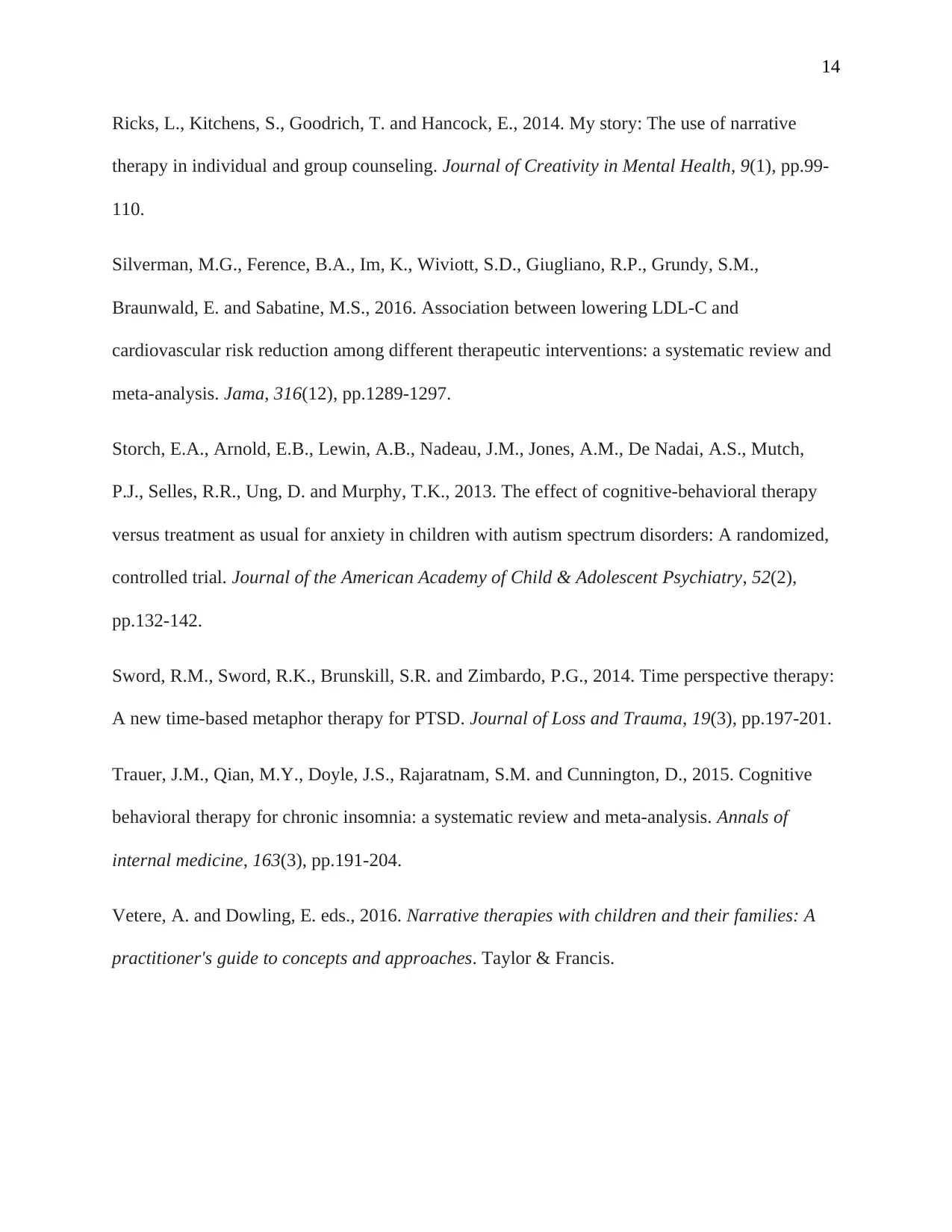
14
Ricks, L., Kitchens, S., Goodrich, T. and Hancock, E., 2014. My story: The use of narrative
therapy in individual and group counseling. Journal of Creativity in Mental Health, 9(1), pp.99-
110.
Silverman, M.G., Ference, B.A., Im, K., Wiviott, S.D., Giugliano, R.P., Grundy, S.M.,
Braunwald, E. and Sabatine, M.S., 2016. Association between lowering LDL-C and
cardiovascular risk reduction among different therapeutic interventions: a systematic review and
meta-analysis. Jama, 316(12), pp.1289-1297.
Storch, E.A., Arnold, E.B., Lewin, A.B., Nadeau, J.M., Jones, A.M., De Nadai, A.S., Mutch,
P.J., Selles, R.R., Ung, D. and Murphy, T.K., 2013. The effect of cognitive-behavioral therapy
versus treatment as usual for anxiety in children with autism spectrum disorders: A randomized,
controlled trial. Journal of the American Academy of Child & Adolescent Psychiatry, 52(2),
pp.132-142.
Sword, R.M., Sword, R.K., Brunskill, S.R. and Zimbardo, P.G., 2014. Time perspective therapy:
A new time-based metaphor therapy for PTSD. Journal of Loss and Trauma, 19(3), pp.197-201.
Trauer, J.M., Qian, M.Y., Doyle, J.S., Rajaratnam, S.M. and Cunnington, D., 2015. Cognitive
behavioral therapy for chronic insomnia: a systematic review and meta-analysis. Annals of
internal medicine, 163(3), pp.191-204.
Vetere, A. and Dowling, E. eds., 2016. Narrative therapies with children and their families: A
practitioner's guide to concepts and approaches. Taylor & Francis.
Ricks, L., Kitchens, S., Goodrich, T. and Hancock, E., 2014. My story: The use of narrative
therapy in individual and group counseling. Journal of Creativity in Mental Health, 9(1), pp.99-
110.
Silverman, M.G., Ference, B.A., Im, K., Wiviott, S.D., Giugliano, R.P., Grundy, S.M.,
Braunwald, E. and Sabatine, M.S., 2016. Association between lowering LDL-C and
cardiovascular risk reduction among different therapeutic interventions: a systematic review and
meta-analysis. Jama, 316(12), pp.1289-1297.
Storch, E.A., Arnold, E.B., Lewin, A.B., Nadeau, J.M., Jones, A.M., De Nadai, A.S., Mutch,
P.J., Selles, R.R., Ung, D. and Murphy, T.K., 2013. The effect of cognitive-behavioral therapy
versus treatment as usual for anxiety in children with autism spectrum disorders: A randomized,
controlled trial. Journal of the American Academy of Child & Adolescent Psychiatry, 52(2),
pp.132-142.
Sword, R.M., Sword, R.K., Brunskill, S.R. and Zimbardo, P.G., 2014. Time perspective therapy:
A new time-based metaphor therapy for PTSD. Journal of Loss and Trauma, 19(3), pp.197-201.
Trauer, J.M., Qian, M.Y., Doyle, J.S., Rajaratnam, S.M. and Cunnington, D., 2015. Cognitive
behavioral therapy for chronic insomnia: a systematic review and meta-analysis. Annals of
internal medicine, 163(3), pp.191-204.
Vetere, A. and Dowling, E. eds., 2016. Narrative therapies with children and their families: A
practitioner's guide to concepts and approaches. Taylor & Francis.
1 out of 14
Related Documents
Your All-in-One AI-Powered Toolkit for Academic Success.
+13062052269
info@desklib.com
Available 24*7 on WhatsApp / Email
![[object Object]](/_next/static/media/star-bottom.7253800d.svg)
Unlock your academic potential
© 2024 | Zucol Services PVT LTD | All rights reserved.





